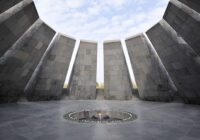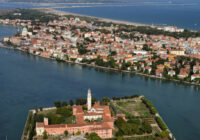The German parliament damns Turkey for conducting genocide against Armenians in 1915, achieving little except strengthening President Erdoğan.
This week, the European Union (EU) officially warned Poland that changes to its constitutional court endanger rule of law; South Carolina became the 17th state in the US to ban abortion starting from the 20th week of pregnancy with no exception for protecting the woman’s health; Uber raised $3.5 billion from Saudi Arabia’s sovereign wealth fund; OPEC failed to agree to limit oil output in Vienna; the European Central Bank (ECB) also met in Vienna to keep interest rates unchanged; and the rhetoric over Brexit ratcheted up with John Major declaring that the British people were being deceitfully misled, among others, by “court jester” Boris Johnson.
As with most weeks during this eventful year, selecting the key developments is not an entirely straightforward one. Yet one development stands out this week because it ties in issues of history, narrative, crime, guilt, atonement, identity, international relations and more in a heady cocktail that promises to leave quite a hangover. On June 2, the Bundestag, the German parliament, almost unanimously voted to declare that the Turkish 1915-16 killings of Armenians was “genocide.”
Turkey is furious. It recalled its ambassador “for consultations over the German parliament’s decision” and declared that Germany had made a historic mistake. German Chancellor Angela Merkel, who was conveniently not in the Bundestag during the time of the vote, tried to soothe frayed Turkish nerves by purring that relations between Turkey and Germany remained “broad and strong.”
In 1961, Edward Hallett Carr delivered the George Macaulay Trevelyan Lectures at the University of Cambridge. These were later published as What is History? a book that has gone on to become a classic. Carr brilliantly pointed out that historians choose a few facts to be historic such as Julius Caesar crossing the Rubicon. Facts are chosen or ignored quite arbitrarily, making history quite a subjective exercise. Yet facts matter and Carr defined history as “a continuous process of interaction between the historian and his facts, an unending dialogue between the present and the past.”
What happened in the German Bundestag this week is less about history and more about identity. Germany is a country that still wallows in guilt. During World War II, the Nazis were responsible for the Holocaust. An estimated 6 million Jews and another 5 million Poles, Slavs, Romanis, communists et al were killed. Europe and Germany see Nazism was an aberrant phenomenon to the story of the Enlightenment. How else could the land of Immanuel Kant, Johann Wolfgang von Goethe and Johann Sebastian Bach end up becoming the land of Adolf Hitler, Hermann Wilhelm Göring and Paul Josef Goebbels?
The truth is that, like most stories, the European story is complicated. The formation of European nation states was a bloody and brutal process. In England, the Puritans were persecuted and fled to North America. In their new land of the free and the home of the brave, they largely exterminated the natives to take over their land and resources. Spain expelled the enlightened Moors of Andalucía. Ferdinand and Isabella got rid of all the Jews in 1492. Spanish conquistadores unleashed an orgy of violence on pagan natives, killing them wantonly, raping their women and robbing them of gold, silver and land.
The idea of “un roi, une foi, une loi” (one king, one faith, one law) was fundamental to the European state formation. Unlike the contemporaneous Ming, Mughal and Ottoman Empires, European nation states were uniform enterprises where one people speaking one language united to forge their common destiny. In the process, they savaged natives of distant lands, fought their neighbors and persecuted their minorities. Even fellow Christians were not safe, as Huguenots found to their horror during the St. Bartholomew’s Day Massacre and les dragonnades.
Once the Turks were beaten back from the gates of Vienna in 1683, European nation states waxed whilst Ottoman Turkey waned. By the end of the 19th century, Turkey was the sick man of Europe. This rambling empire with multiple religious minorities failed to embrace the Industrial Revolution or adopt modern military technology. Yet minorities, even though subordinate, were better off under the Ottomans than European states.
Like the Habsburgs, the Ottomans did not survive World War I. Mustafa Kemal Atatürk led a revolution that beat back the victorious allies and set out to create a European-style nation state. The various territories of the Ottomans had already been whittled away. Now, all the Turks were to be united in a cohesive nation. Roman alphabet, European dress, emancipated women, modern technology and secularism were supposed to yoke Turkey into modernity.
Atatürk’s revolution never entirely succeeded. Islam never ceased to be important in a socially conservative land. Ultimately, secularism was guaranteed by the barrel of the gun. The military kept Islam under wraps. In the new post-Cold War zeitgeist, religion reassumed its traditional importance. Astute observers could see the clash between rural Muslim society and cosmopolitan Istanbul coming.
Unsurprisingly, Recep Tayyip Erdoğan became prime minister in 2003 and president in 2014. From day one, he began expanding his powers. Today, Erdoğan is a sultan, albeit an elected one. He has survived protests regarding Gezi Park, accusations of corruption and outrage over the 1,000-room Ak Saray, or the White Palace, which happens to be bigger than the White House or the Kremlin.
Many Turks love Erdoğan for the same reason that Russians love Vladimir Putin. He is proud of his faith and tradition. His wife wears a headscarf in public. Erdoğan stands up to big powers for Turkey. He has leveraged the refugee crisis to extort concessions and cash from Europe in general and Germany in particular. He has exhorted women to have at least three children and has declared a woman’s life to be “incomplete” if she fails to reproduce. For traditional Turks, Erdoğan is a man with the courage of conviction who fights for his beliefs.
Erdoğan cares about great power status. He has set out to bury Atatürk and reclaim the legacy of the Ottoman Empire. Therefore, any slur on the Ottoman record is a touch too close to Sultan Erdoğan’s bone. Turkey has long denied that it was responsible for the “genocide” of Armenians. Unsurprisingly, Erdoğan has declared that Turkey was ready to “pay the price” for mass killings of Armenians if, and only if, an “impartial board of historians” find the dying Ottoman Empire guilty. So far, 20 countries have formally recognized genocide against Armenians.
The entire brouhaha over the issue of Armenian genocide raises three key questions.
Philosophically, the first question that begs asking is whether national parliaments ought to be passing laws on terminology of events past. In World War I, Germany was an ally of Turkey and it seems that this law is to mitigate its own Lutheran sense of sin. It ties in with the modern German narrative of deep guilt and public penitence. By voting against Turkey, German politicians are engaging in collective catharsis. It makes them look good and may help them get reelected. But what does passing a resolution or law about terminology regarding a century-old even actually achieve?
The second question is who should be judging the past? Argentina, Belgium, Canada, France, Italy, Russia and Uruguay have recognized the Armenian “genocide” as has Pope Francis. However, no Muslim nation has done so. Even India, a largely Hindu nation, has not dared to. Pope Francis is unlikely to apologize for genocide of natives in Latin America or the Inquisition in Goa. Ethnicity and religion still matter. Unfortunately, when nations use charged words like genocide they exacerbate ethnic and religious divides. For once, Erdoğan is right. Whether the Armenian killings are genocide is best left to historians not parliamentarians.
Third, who judges whom, and how far back in the past do we go? Former British colonies could pass laws condemning or terming events of two centuries ago. When the British East India Company took over the eastern part of the Indian subcontinent in 1757, a third of the population died within 16 years. Yet no country, including India, has termed this death of an estimated 10 million people genocide. If the fashion of digging up dead ghosts of the past catches on, then finger pointing will the name of the game. Politicians in South Africa who are failing their electorates might pass one resolution after another to manipulate public emotion and prey on outrage instead of rolling up their sleeves and getting things done.
In a turbulent world, there is already a strong resentment against injustices, real and imagined. Many Turks see this act of Germany as betrayal of an ally that lost everything as a result of going to war. Despite hurt feelings, not much will change. Both the Germans and the Turks need each other. After the huffing and puffing will come the kissing and making up. More pertinently, the German Bundestag has hurt Turkish pride and will end up helping Erdoğan to become more of a sultan.
*[You can receive “The World This Week” directly in your inbox by subscribing to our mailing list. Simply visit Fair Observer and enter your email address in the space provided. Meanwhile, please find below five of our finest articles for the week.]
In a Post-Obama World
Obama is not only a pop-cultural phenomenon, but also a pragmatic leader. His successor will have to deal with a worldwide net of dependencies.
At the end of his eighth and final address at the annual White House Correspondents’ Dinner, US President Barack Obama pulled a “Kobe Bryant” when he dropped a microphone at arm’s length with the words, “Obama out.”
It is references to popular culture like this that constitute a huge bulk of Obamamania with younger people globally, amongst whom he will be sorely missed—though that is certainly not the only reason to look back at the last eight years with some wistfulness, as David Brooks first put forth earlier this year.
When Obama won the presidency in 2008, he entered the international stage with the promise of change from unilateral to multilateral politics and from Western-centric to culturally sensitive approaches in international relations. Already in the early days of his first term in off… Read more
What Really Matters in This Election Cycle
Only the intellectual empowerment of Americans can stem the tide of distracting voters from real policies, says Naomi Wolf.
The success of extremes in America’s political scene speaks, these days, to how dispossessed and voiceless many Americans now feel. A new edition of an important citizen’s guide and handbook—Jessamyn Conrad’s What You Should Know About Politics… But Don’t—explains why.
Some of the issues that are surfacing again and again in our news stream in 2016 are directly interlocking. They deal with issues of personal freedom and constitutional rights versus national security claims. Usually, these themes are reported upon as “symptoms.” For example, a protest in Detroit within the Black Lives Matter movement is reported as if it is a discrete event. The controversy over Edward Snowden’s revelations is reported as if that is simply the story of an individual making controversial individual choices. The reportage is often personalized. Accounts of Islamic State (IS) incursions in Iraq… Read more
Does Beijing Want Peace in the South China Sea?
For peace to prevail, China must show restraint with its territorial disputes in the Asia Pacific.
In April, Chinese President Xi Jinping announced a new security doctrine proposing an international system for security governance based on Asian features, which included openness and inclusiveness. The Chinese leader emphasized that the US pivot to Asia has not brought peace to the region. “Hence, the U.S.-led alliance system is not the right option to safeguard the peace and stability of Asia.”
From the Chinese president’s comments, it seems this new strategy is mainly to counter US efforts to rebalance power and address rising security tensions in the Asia Pacific.
President Xi also called for the region’s countries to work together with China to safeguard peace and stability. The policy envisions a regional security model with a “dual-track approach,” integrating the Chinese dream of national rejuvenation with the Asian dream for a brighter future.
The United States, however, has continued its involvement… Read more
The Drone Goes On
It can only be hoped that one day America will choose to actually live by the standards enunciated by its president in Hiroshima.
There is new evidence that humans have the capacity to never learn from their mistakes. Last week brought news that President Barack Obama celebrated the death by US drone of the top ranking Taliban leader in Afghanistan and then authorized the sale of billions of dollars of weapons made in America to Vietnam. So, again, here we go again and again.
For a president often described as cerebral and a reluctant warrior, Obama is sure playing the killing fool card in America’s game of drones and international military monopoly.
The “take out the leaders” plan has repeatedly failed to achieve any sustainable objectives in America’s strategic killing campaign in the Middle East, Libya and Afghanistan. The list of announced “terrorist leaders” buried in the sand keeps growing. Yet, somehow, so does the supposed threat from… Read more
Muslims Battered On Both Sides of the Atlantic
Just think for a moment: Why are refugees headed for Europe and beyond?
“Things fall apart; the centre cannot hold; / Mere anarchy is loosed upon the world, / The blood-dimmed tide is loosed, and everywhere / The ceremony of innocence is drowned; / The best lack all conviction, while the worst / Are full of passionate intensity.”
There are plenty of interpretations of this poem, written by W.B. Yeats after World War I, and its memorable lines have inspired many novel and film titles. It is especially appropriate today as we see the failure of the center to hold against the tide of radicalism from the left and right.
Attempts to reason against the illogic of blaming all Muslims for the acts of a very few fall on deaf ears among skinheads, Donald Trump supporters or others who are too ready to blame “the other.” The center cannot hold because it has little capacity to counter extremism… Read more
The views expressed in this article are the author’s own and do not necessarily reflect Fair Observer’s editorial policy.
Photo Credit: Drop of Light / Shutterstock.com
 We bring you perspectives from around the world. Help us to inform and educate. Your donation is tax-deductible. Join over 400 people to become a donor or you could choose to be a sponsor.
We bring you perspectives from around the world. Help us to inform and educate. Your donation is tax-deductible. Join over 400 people to become a donor or you could choose to be a sponsor.
Support Fair Observer
We rely on your support for our independence, diversity and quality.
For more than 10 years, Fair Observer has been free, fair and independent. No billionaire owns us, no advertisers control us. We are a reader-supported nonprofit. Unlike many other publications, we keep our content free for readers regardless of where they live or whether they can afford to pay. We have no paywalls and no ads.
In the post-truth era of fake news, echo chambers and filter bubbles, we publish a plurality of perspectives from around the world. Anyone can publish with us, but everyone goes through a rigorous editorial process. So, you get fact-checked, well-reasoned content instead of noise.
We publish 2,500+ voices from 90+ countries. We also conduct education and training programs
on subjects ranging from digital media and journalism to writing and critical thinking. This
doesn’t come cheap. Servers, editors, trainers and web developers cost
money.
Please consider supporting us on a regular basis as a recurring donor or a
sustaining member.
Will you support FO’s journalism?
We rely on your support for our independence, diversity and quality.











